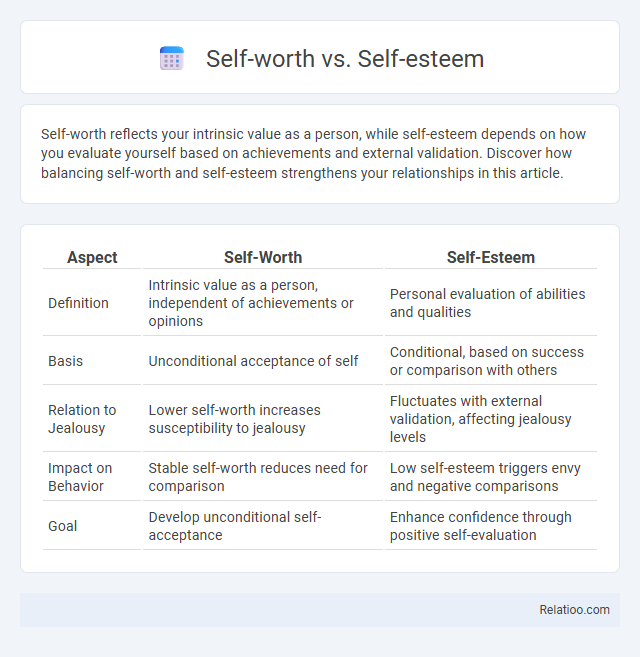Self-worth reflects your intrinsic value as a person, while self-esteem depends on how you evaluate yourself based on achievements and external validation. Discover how balancing self-worth and self-esteem strengthens your relationships in this article.
Table of Comparison
| Aspect | Self-Worth | Self-Esteem |
|---|---|---|
| Definition | Intrinsic value as a person, independent of achievements or opinions | Personal evaluation of abilities and qualities |
| Basis | Unconditional acceptance of self | Conditional, based on success or comparison with others |
| Relation to Jealousy | Lower self-worth increases susceptibility to jealousy | Fluctuates with external validation, affecting jealousy levels |
| Impact on Behavior | Stable self-worth reduces need for comparison | Low self-esteem triggers envy and negative comparisons |
| Goal | Develop unconditional self-acceptance | Enhance confidence through positive self-evaluation |
Understanding Self-Worth: Core Concepts
Understanding self-worth involves recognizing your intrinsic value independent of external achievements or opinions, while self-esteem often fluctuates based on performance or feedback. Worthiness ties closely to the belief that you deserve love, respect, and happiness simply by being. Developing a strong sense of self-worth empowers you to maintain confidence and resilience regardless of circumstances.
Defining Self-Esteem: Meaning and Scope
Self-esteem refers to an individual's overall evaluation of their own worth, encompassing beliefs about oneself as well as emotional states such as pride or shame. It involves a balance between self-respect and self-confidence, influencing mental health, motivation, and social relationships. Unlike self-worth, which is an inherent sense of value, self-esteem can fluctuate based on experiences and external validation.
Key Differences Between Self-Worth and Self-Esteem
Self-worth represents an intrinsic sense of value, independent of external achievements or opinions, while self-esteem fluctuates based on specific accomplishments, feedback, and social comparisons. Self-worth remains stable as it is grounded in the belief that one is inherently deserving of respect and love, whereas self-esteem often depends on how well one perceives they meet external standards. Worthiness relates closely to self-worth but emphasizes feeling deserving of happiness, success, and healthy relationships, highlighting internal acceptance over performance-based validation.
Origins: Where Do Self-Worth and Self-Esteem Come From?
Self-worth originates from an inherent sense of value tied to your existence, often influenced by early childhood experiences and unconditional love from caregivers. Self-esteem develops through external validation and accomplishments, shaped by social interactions, feedback, and recognition throughout life. Understanding these origins helps you build a foundation for genuine worthiness, which combines both internal acceptance and external achievements.
The Role of External Validation in Self-Esteem
Self-esteem is significantly influenced by external validation, as it often depends on how others perceive and affirm your value, unlike self-worth and worthiness which are more intrinsic and stable internal beliefs. While self-esteem fluctuates based on social feedback and achievements, self-worth and worthiness remain constant regardless of external opinions or validation. Understanding this distinction helps you build a resilient sense of self that is less dependent on approval from the outside world.
Cultivating Unconditional Self-Worth
Cultivating unconditional self-worth involves recognizing inherent value beyond external achievements or validation, differentiating it from self-esteem, which often fluctuates based on success or approval. Unlike self-esteem, tied closely to accomplishments and social comparisons, self-worth remains stable through acceptance of oneself without conditions. Embracing unconditional self-worth fosters resilience, authentic confidence, and emotional well-being by affirming intrinsic human dignity regardless of external circumstances.
Impact on Mental Health: Self-Worth vs Self-Esteem
Self-worth and self-esteem both significantly influence mental health, but self-worth involves an inherent sense of value independent of achievements or external approval, fostering resilience and emotional stability. In contrast, self-esteem fluctuates based on success, social validation, and comparison, making it more vulnerable to anxiety and depression when self-evaluations are negative. Prioritizing self-worth enhances long-term mental well-being by promoting unconditional self-acceptance, whereas relying solely on self-esteem can lead to fragile self-perceptions and emotional distress.
Challenges to Building Self-Worth and Self-Esteem
Challenges to building self-worth and self-esteem often stem from negative self-perceptions and external criticism, leading to feelings of inadequacy and decreased confidence. Persistent comparison with others and unrealistic societal standards exacerbate struggles in recognizing intrinsic value and worthiness. Overcoming these obstacles requires mindful self-reflection, positive affirmations, and cultivating environments that reinforce personal strengths and acceptance.
Strategies for Enhancing Self-Worth and Self-Esteem
Boosting your self-worth and self-esteem involves practicing self-compassion, setting realistic goals, and celebrating small achievements regularly. Engaging in positive self-talk and surrounding yourself with supportive people nurture your internal value and reinforce a healthy sense of worthiness. Developing these strategies consistently transforms your mindset, promotes emotional resilience, and strengthens your overall well-being.
Integrating Healthy Self-Worth and Self-Esteem in Daily Life
Integrating healthy self-worth and self-esteem into daily life involves recognizing intrinsic value beyond external achievements or approval, fostering a balanced internal sense of worthiness. Practices such as positive self-affirmations, setting realistic personal goals, and engaging in self-compassion enhance emotional resilience and authentic confidence. Consistent mindfulness and constructive feedback reinforce an enduring foundation for personal growth and well-being.

Infographic: Self-worth vs Self-esteem
 relatioo.com
relatioo.com